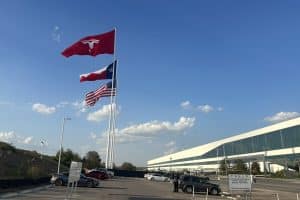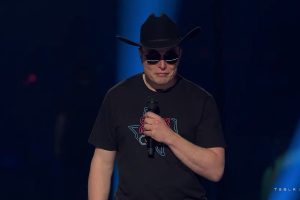The Boring Company’s (TBC) test drives for its Las Vegas Convention Center Loop (LVCC) exceeded 4,400 passengers per hour, according to results revealed on May 29. Steve Hill, the Chief Executive Officer and President of the Las Vegas Convention and Visitors Authority (LVCVA), announced the results of TBC’s LVCC Loop test run with real passengers.
Following Hill’s announcement, The Boring Company elaborated that the LoopSim—loop simulation—predicted the LVCC Loop could handle 4,450 passengers per hour (pph) within a 1% observed value for a V3 configuration with 62 Tesla vehicles. TBC seemed happy with the results.
“So this was a good anchor for our model,” TBC noted. “[The LoopSim] predicts 5050 for V4 at the Convention Center. And 55,000 pph for the full Vegas Loop!”
TBC’s comments on the results of its first LVCC Loop test drives suggest that the tunneling company will continue to improve the Loop’s capacity over time. The Boring Company still has to develop some key factors in the LVCC Loop, including the introduction of autonomous operations. TBC signed an agreement with the LVCVA board to implement autonomous operations to the LVCC Loop “no later than December 31 2021. “
Some people have pointed out that a bus or subway could transport more people within an hour than the LVCC Loop. However, TBC supporters argued that the fare for Elon Musk’s underground people-mover is cheaper compared to traditional transportation.
TBC tunnels may also be cheaper to construct than subway systems and other infrastructure that cities, towns, etc., might consider to reduce congestion in certain areas. For instance, Mayor Francis Suarez from Miami noted that TBC quoted $30 million for a tunnel under the Miami River. In comparison, the Miami-Dade County transit officials estimated a $900 million price tag for a tunnel about 2-miles long for the same project.
The Boring Company also points out that its transit system could get passengers to their destination much faster than the subway.
“Loop is an express public transportation system that resembles an underground highway more than a subway system,” TBC explained on its website.
“If a subway line had 100 stops, a train would typically stop at each station, so the trip between Stop 1 and Stop 100 would be long. In contrast, Loop passengers travel directly to their destination, anywhere between Stop 1 to Stop 100, without stopping at the intermediate stations. Also, the express system allow[s] Loop vehicles to travel faster than conventional subway cars (up to 150 mph vs. up to 65 mph).”
Watch a video of The Boring Company’s LVCC Loop test drives below!





